By Sarah S. Brannen
Ice dancer Karina Manta’s new memoir, On Top of Glass (Alfred A. Knopf, October 2021), begins with spoilers. She confesses right up front that she reads movie plots before she sees the films and looks at the last page of books first.

“My mind likes to busy itself with worst-case scenarios,” Manta writes. “I just always want to know — to confirm — that things will be OK in the end.”
She begins her story remembering herself as a young teenager, Googling “lesbian figure skater” and finding pretty much nothing. The book then goes back to the day of her birth and tells her personal story — which includes skating but is not really about skating — up to the present. Manta is still only 25, which is admittedly young to write a memoir.
“I love a coming-of-age story. I love YA [young adult] books,” Manta told SKATING magazine. “The book is for teenage girls, and I’m still in a place where I’m close enough to communicate that accurately.”
The book is laid out in short vignettes in mostly chronological order. Manta gives us a portrait of herself as a shy, anxious girl who didn’t feel comfortable with herself or her peers, thinking of herself as unattractive and awkward in nearly every setting. She loved dance classes though, and after skating at a birthday party she begged hard for lessons.
“Even at 5 years old, I loved with an intensity that was blinding and dangerous.”
Manta writes often and at length about her love for ice dancing, which she began at 15.
“Ice dance seemed to give every piece of me a reason to exist,” she writes. Even at her high school prom, which she attended with Olympian Jason Brown, she thought, Heaven might be a dance floor.
Throughout the book, Manta talks candidly about her struggles with anxiety and panic attacks, and an eating disorder that started in eighth grade.
“I didn’t think of myself as a beautiful creature anymore, and it broke my heart. Starving felt like stealing the smallest piece of womanhood back. … I had convinced myself that the easiest way to be a woman was to pretend I could go without emotions, attention, or even food.”
Manta credits her housemates, Brown and another skater, with helping her finally beat anorexia. And she interjects a warning for anyone who might be tempted to copy her disordered eating: “If my book ever makes you want to measure out your meals, please close its covers. If any chapter ever makes you want to erase your body, please put these pages down and go have a snack. If you are looking for more ways to harm yourself, pay attention to me now — I love you. I want you to learn how to love yourself.”

On the phone, she said, “At the rink I always thought of myself as the older sister of every girl who walked in, because I knew how hard it was for me, moving to Colorado as a teenager, not knowing anyone.”
Manta carries readers through her skating career, touching lightly on training and competitions. Although she admits that she felt driven to succeed on the ice, her book is much more about her internal struggles than about results and medals.
We hear a bit about her partnership with Joe Johnson, which culminated in their “Sweet Dreams” free dance that brought the house down at the 2019 U.S. Championships, and continued when they joined the cast of Cirque du Soleil (They are still skating together).
Manta’s revelations about her relationship with her own body are searing; she knew that she could look good and skate well, but any criticism from a coach about her body sent her into a dark place. She is equally frank about her confusion about her sexuality, finally finding an answer in quantum mechanics. (Yes, really. And it’s a thing). The more she began to understand herself, the more she felt out of place in the blatantly heterosexual world of ice dance. No female skater had ever come out while competing on the international circuit.
“I’d spent so many years uncomfortable with myself, I wasn’t sure how to live openly. I didn’t know how to survive without secrets and restraint.”
Fans may remember the romantic video in which Manta finally came out as part of the LGBTQ+ community, revealing that she had been in a relationship with a woman for a year. She and Johnson garnered a lot of attention as the first out LGBTQ+ figure skating team to compete. It’s nice to get the back story of how it happened.
The chapters skim along, combining introspection with anecdotes, and a clear-eyed understanding of how the shy child became the woman who stands today as a role model for skaters and LGBTQ+ youth. Manta was an English major in college and it shows. She writes with clarity and detail, including a lot of pain and a lot of joy. And she says, firmly, “If you are someone who needs to be assured, I can assure you: Things will be OK in the end.”
Sarah S. Brannen is the author of A Perfect Day and Uncle Bobby’s Wedding as well as many other books for children. She was a writer for icenetwork for 10 years and she has been writing for SKATING magazine since 2004.

